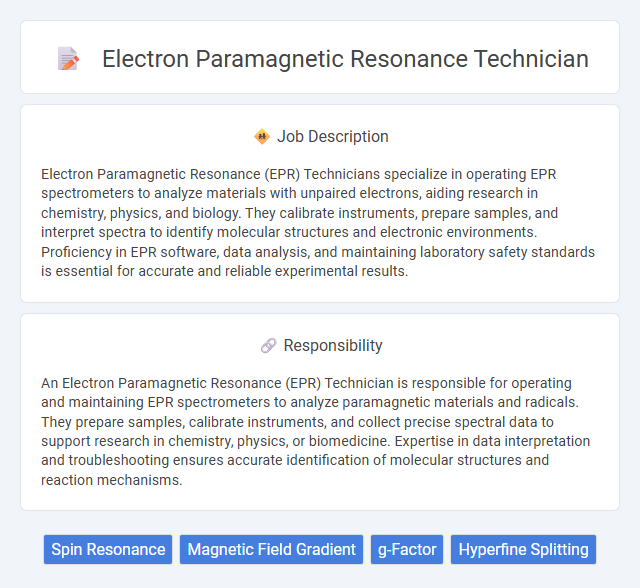
Electron Paramagnetic Resonance (EPR) Technicians specialize in operating EPR spectrometers to analyze materials with unpaired electrons, aiding research in chemistry, physics, and biology. They calibrate instruments, prepare samples, and interpret spectra to identify molecular structures and electronic environments. Proficiency in EPR software, data analysis, and maintaining laboratory safety standards is essential for accurate and reliable experimental results.
People with strong attention to detail and patience are likely to be well-suited for an Electron Paramagnetic Resonance Technician role, as it involves handling complex instruments and interpreting subtle signal variations. Those comfortable working in laboratory settings and following strict safety protocols probably find this job compatible with their skills and work style. Individuals who prefer highly dynamic or physically demanding tasks might struggle with the meticulous and repetitive nature of this position.
Qualification
An Electron Paramagnetic Resonance (EPR) Technician requires a strong background in physics, chemistry, or materials science, typically possessing a bachelor's degree in one of these fields. Proficiency in operating EPR spectrometers and interpreting resonance data is essential for accurately analyzing paramagnetic substances. Experience with sample preparation, calibration procedures, and troubleshooting spectroscopic equipment enhances the technician's ability to support advanced research and quality control in scientific laboratories.
Responsibility
An Electron Paramagnetic Resonance (EPR) Technician is responsible for operating and maintaining EPR spectrometers to analyze paramagnetic materials and radicals. They prepare samples, calibrate instruments, and collect precise spectral data to support research in chemistry, physics, or biomedicine. Expertise in data interpretation and troubleshooting ensures accurate identification of molecular structures and reaction mechanisms.
Benefit
Working as an Electron Paramagnetic Resonance (EPR) Technician probably offers competitive salary prospects and opportunities for career advancement in specialized scientific fields. Employees may benefit from gaining hands-on experience with advanced spectroscopic equipment, enhancing technical skills highly valued in research and industry. Access to collaborative research environments and potential involvement in cutting-edge studies could further enrich professional growth and job satisfaction.
Challenge
Working as an Electron Paramagnetic Resonance (EPR) Technician likely involves complex instrumentation challenges and precise data interpretation demands. The role probably requires overcoming technical difficulties related to maintaining sensitive equipment and ensuring accurate sample analysis. This position may also entail adapting to evolving experimental protocols and troubleshooting unexpected paramagnetic signal anomalies.
Career Advancement
Electron Paramagnetic Resonance (EPR) Technicians gain specialized expertise in analyzing paramagnetic materials, which positions them for advanced roles in research and development within biotechnology, pharmaceuticals, and materials science industries. Mastery of EPR instrumentation and data interpretation facilitates progression to senior technical specialist or laboratory management roles, often supported by additional certifications or technical training. Career advancement opportunities also include transitioning into roles such as scientific application specialists or technical sales representatives for EPR equipment manufacturers, leveraging both technical knowledge and communication skills.
Key Terms
Spin Resonance
Electron Paramagnetic Resonance Technician specializes in operating and maintaining EPR spectroscopy instruments to analyze paramagnetic substances by detecting unpaired electron spins. Expertise in spin resonance techniques enables precise measurement of electron spin states, aiding in material characterization, biochemical research, and radical detection. Proficiency in sample preparation, data interpretation, and spectrum analysis ensures accurate identification of molecular structures and dynamic processes involving spin behaviors.
Magnetic Field Gradient
Electron Paramagnetic Resonance (EPR) Technicians specialize in manipulating and calibrating magnetic field gradients to enhance spectral resolution in paramagnetic sample analysis. Mastery of magnetic field gradient control allows precise spatial encoding, critical for detecting subtle electron spin interactions and structural variations in complex molecules. Proficiency in gradient field optimization directly impacts the quality and accuracy of EPR data, supporting advanced material and biochemical research.
g-Factor
An Electron Paramagnetic Resonance (EPR) Technician specializes in measuring the g-factor, a key parameter that characterizes the magnetic properties of unpaired electrons in paramagnetic materials. Accurate determination of the g-factor helps in identifying electronic environments, detecting molecular interactions, and analyzing spin states in complex samples. Mastery of EPR instrumentation and data interpretation is essential for extracting precise g-factor values critical for research and industrial applications.
Hyperfine Splitting
An Electron Paramagnetic Resonance (EPR) Technician specializes in operating and maintaining EPR spectrometers to analyze materials with unpaired electrons. A key focus of this role involves interpreting hyperfine splitting patterns, which provide critical information about electron-nuclear interactions and local magnetic environments. Proficiency in analyzing hyperfine splitting enables accurate characterization of paramagnetic species, essential for research in chemistry, materials science, and biology.
 kuljobs.com
kuljobs.com